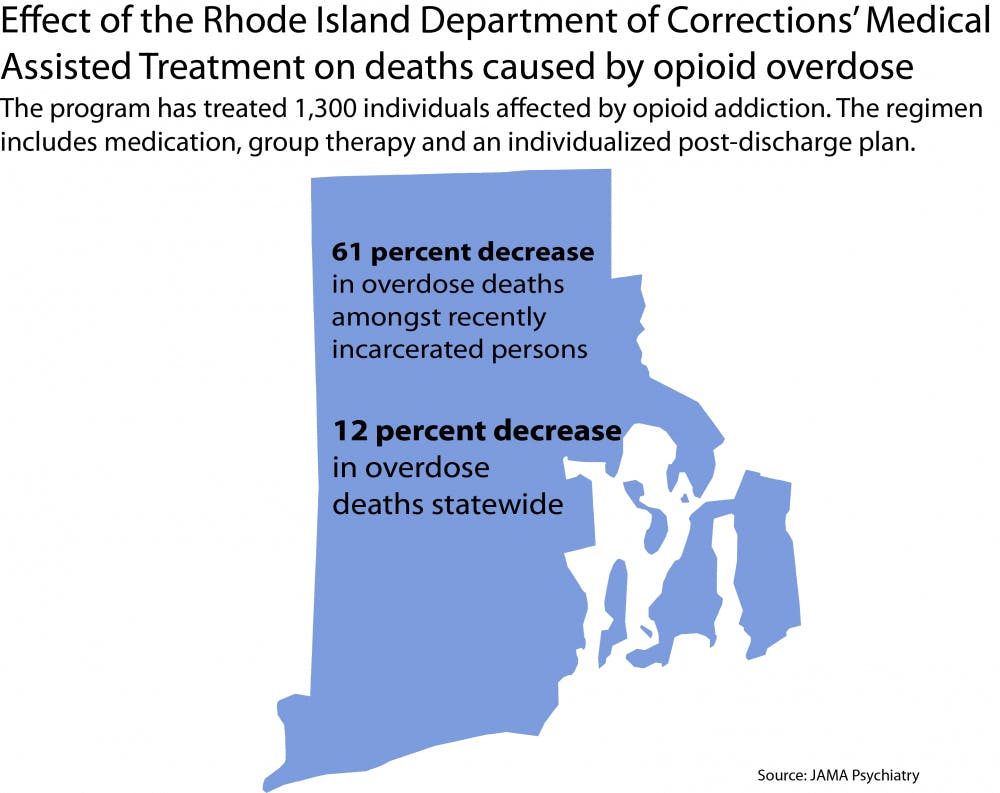The Rhode Island Department of Corrections’ medication-assisted treatment program reduced overdose deaths among recently incarcerated persons in the state by 61 percent and cut the number of overdose deaths statewide by nearly 12 percent, according to a recent study published by JAMA Psychiatry.
The program, which began July 2016, treated 1,300 individuals afflicted with opioid use disorder in jails and prisons in its first year, according to Substance Abuse Coordinator Lauranne Howard. Now in its second year, the department is expected to exceed that figure, she added.
The program initially grew out of Governor Gina Raimondo’s Overdose Prevention and Intervention Task Force, which details how the state should reduce opioid overdose deaths in the next three years, said Public Information Officer of the R.I. Department of Health Joseph Wendelken.
“We were looking at where we wanted to focus our treatment efforts (and) which populations were at highest risks,” Wendelken said, adding that a priority of Raimondo’s initiative is extending treatment to those who have been incarcerated.
Mortality rates as a result of overdose are much higher among individuals recently released from correctional facilities — specifically in the first two weeks after release — than the general population, said Jennifer Clarke, associate professor of obstetrics and gynecology and medical programs director of the Department of Corrections. When an individual experiences “a period of forced abstinence,” their tolerance will significantly drop, Clarke said. A lower tolerance leaves recently released persons at greater risk for overdose death if they resume using opioids at the same dosages as before their incarceration.
“With this program, we’re trying to eliminate that increased risk by treating as many people as possible,” Clarke added. “It’s going very well.”
Each individual entering a R.I. prison or jail is screened and evaluated for opioid use disorder. The RIDOC MAT program will then place individuals diagnosed with the disorder on their own, unique regimen, which includes one of the three Food and Drug Administration-approved medications for opioid use disorder, group meetings, individual counseling and discharge planning for when they leave the facility.
While the RIDOC MAT program treats many individuals who are starting treatment for the first time, it also allows people who began treatment prior to entering the RIDOC to stay on their original treatment plan, according to Howard.
“We are having a lot of people come in on treatment who stay on treatment,” Howard said. “Then there are folks who may have been here for a while but their discharge date is coming up and they are really worried about their ability to handle their addiction in the community and they’ve asked to be put on treatment … as well.”
The official in charge of planning discharges ensures that individuals on the program leave the facility with access to an opioid treatment program in the community, allowing them to continue treatment without pause, Howard said.
CODAC Behavioral Healthcare, a Rhode Island-based non-profit involved with addiction treatment and education, is responsible for providing the medication determined by RIDOC’s program. While being treated, individuals are registered within CODAC’s system and are considered CODAC patients, which allows them to be seen at any of the CODAC locations throughout the state upon release, Clarke said. During the discharge process, patients have the opportunity to change their treatment provider from CODAC to other treatment centers, such as Discovery House Comprehensive Treatment Center of Rhode Island or The Journey to Hope, Health and Healing, Wendelken said.
Looking forward, Howard hopes the program can expand to treat more people for a longer period of time. Currently, only those with a sentence of a year or less are qualified for MAT due to the costs of treatment. “Now that we have a year behind us, we would definitely like to expand the length of time that we’re able to treat people to perhaps two years,” Howard said.
The program is the first of its kind in the country, according to Clarke. While Rikers Island has had a MAT program for several years, it only offers methadone, one of the three FDA-approved medications for opioid use disorder. RIDOC’s program offers the other two FDA-approved medications, buprenorphine and naltrexone, said co-author of the JAMA psychiatry study Dr. Josiah Rich, professor of medicine and epidemiology.
Rich believes the program’s success is the “first piece of good news of this epidemic in years.” Rich, alongside other researchers, is now collecting more data on those who have participated in the program to determine if they stay on treatment after discharge, he said. Rich is expecting to have more answers in the next year, he added.





